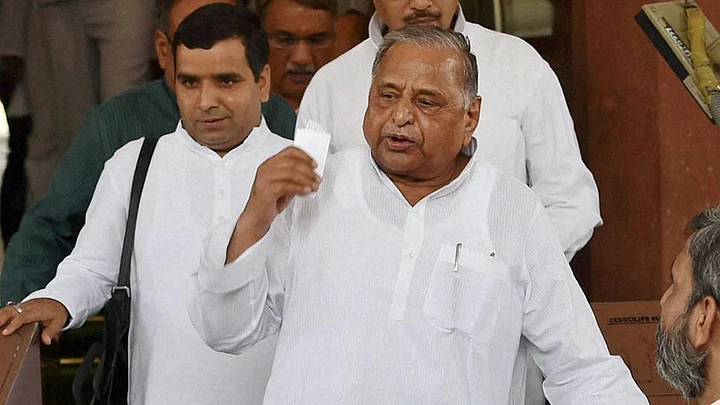If the psychological aspects of the turmoil in UP appear to be more intriguing than the political implications, the reason is that normal familial attitudes have been turned on their heads in the ongoing battle in Mulayam Singh Yadav's household.
In normal circumstances, a parent almost invariably stands by a son or daughter in a troublesome time, even if the offspring is perceived to be less than competent – as in the Congress.
In the Samajwadi Party (SP), however, the opposite has happened. Although Mulayam Singh's son, Chief Minister Akhilesh Yadav, is widely regarded as the best bet for the party because of his likeability and development-oriented outlook, the father has chosen to turn on him.
It is obvious that as a result of the spat, the father has irreparably damaged the SP’s electoral prospects. It is a clear case of perverse priorities where Mulayam Singh has put his own personal grouse against Akhilesh for having outrun him in the popularity stakes to undercut him at the cost of the party.
Where the septuagenarian patriarch should have been happy that his son is seen as a person who may be able to overcome the anti-incumbency factor and ensure the party's success when the elections are held in the state early in 2017, the angry father has chosen to vent his spleen on a successful son.
Where psychology is concerned, the row in the SP may well go down as a test case of a warped outlook which borders on the bizarre, for it cannot be explained by the existence of a generation gap.
Since politics is involved, the father-son confrontation can only be seen in terms of thwarted ambition on Mulayam Singh's part and a refusal to abide by the subservient norms of an Indian joint family on Akhilesh's part where the elders are concerned.
The father's fear apparently is that the son's rise will put an end to his own political future as a leader of consequence.
Having ruled the roost in UP after demonstrating his political mettle in the aftermath of the Babri Masjid demolition in 1992 by defeating a rampaging Bharatiya Janata Party (BJP) in the following year – in the Bahujan Samaj Party’s (BSP) company – Mulayam Singh is simply unwilling to walk into the sunset.
As someone who wanted to be Prime Minister, he apparently cannot conceive of a future outside the corridors of power. So, if his son comes in the way, the latter will have to be pushed aside.
The SP's travails cannot but delight the BJP at a time when it cannot be too sure of how demonetisation will affect its electoral chances in UP.
Although the BJP has been winning a series of municipal polls in several states, it is the Assembly elections which are expected to provide a clear indication of the success or failure of Narendra Modi's daring gamble.
Moreover, out of the ensuing polls in UP, Uttarakhand, Punjab, Goa and Manipur, it is the contest in the largest of the Hindi heartland states which will give a clear answer to the yet unknown effects of the cash crunch on ordinary people.
However, the BJP's problem is that it does not have a chief ministerial face in UP. The BSP is better placed in this regard with former Chief Minister and heroine of the Dalits, Mayawati, at the helm.
The Dalit-Muslim alliance which she is said to have forged is also a winning combination with the Dalits constituting 21 percent of the population in the state and the Muslims 18.
She is also regarded as a "strong" leader who can cure UP – temporarily at least – of its longstanding problem of lawlessness.
But her drawback is that she is not seen to be forward-looking at a time when development has become a key word in electoral politics.
It is Modi's emphasis on economic growth and the consequent job creation which enabled the BJP to virtually sweep the 2014 parliamentary polls in the state when it won 71 of the 80 Lok Sabha seats and its ally, the Apna Dal, two.
Not surprisingly, Akhilesh Yadav, too, has focussed on development. This marks a sharp departure from his party’s traditional caste-based politics, which is associated with his father,who was also against English and computers at one time.
For the BJP, a satisfactory showing will be a big boost after its defeat in the other major Hindi-speaking state of Bihar in 2015. It will set the tone for its possible success in the next general election.
Akhilesh, on the other hand, is in for the long haul. He will still be relatively young when the next assembly elections are held while his father will have realized that his time to call the shots is over.
(This piece has been published in association with IANS.)
